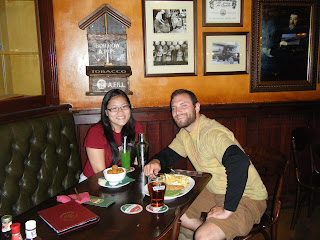I wish I had taken (more) pictures to hit these points home, but I suppose that words will have to suffice for now. Try using your imagination to envision the scenes described below – the more graphic/detailed… the more accurate, probably.
Yesterday I spent several hours at The Sheraton Hotel in downtown K’la for an emergency meeting with the Pilgrim staff. We were served beverages of our choices in a very classy way and sat in comfortable, classy chairs. Afterwards we went to lunch across the street at the Speke Resort, where we ordered steak and calamari. On the way back we passed by several extravagant wedding parties taking their photos on The Sheraton’s large, beautiful lawn. I started to question, “Why does everyone keep telling me that Uganda is in such horrible shape? This place is decked out. These weddings are evidence that these people are very well-off. Where are the orphans and widows that my heart’s cried out for over the last two years??”
Today was very sobering. I spent a few hours in the biggest slum in Kampala (K’la), the capital of Uganda. We were there for a church service and in order to get to the building, we took a winding path through this slum. Nothing paved, lots of alleys. The subtle yet permeating smell of fecal matter and decay hit me immediately as we dodged between people and structures. Keeping my eyes on the ground so I wouldn’t trip, I saw piles of burning rubbish, litter strewn all around, “muddy” streams, open sewage drains, and a whole lot of naked children. People stared and I clutched my bag and Bible closely. One child grabbed my hand for an instant.
 We finally arrived at a very drab, worn-down building filled with congregants in straight-backed benches/pews. After the sermon and announcements, everybody got up to dance and sing. Throughout the service refreshing breezes would come in, oftentimes accompanied by a waft of the aforementioned stench. The building was hot and crowded, but worshippers sang and danced full-force to demonstrate the joy they found in Jesus, despite their poverty and destitution.
We finally arrived at a very drab, worn-down building filled with congregants in straight-backed benches/pews. After the sermon and announcements, everybody got up to dance and sing. Throughout the service refreshing breezes would come in, oftentimes accompanied by a waft of the aforementioned stench. The building was hot and crowded, but worshippers sang and danced full-force to demonstrate the joy they found in Jesus, despite their poverty and destitution.In some ways, I wish I didn’t have to be so concerned about my personal safety. If communicable diseases and theft/rape/kidnapping weren’t issues, I’d have stopped to say hi to many of the people in the slums. (I did get to smile, wave, and say hi to one group of children, which sent them into a fit of giggles and grins.) On the way back from church, I saw at least one child with a bloated belly from malnutrition and one or two more wearing nothing more than string thongs. Most of the children were naked or drably garnished in filthy, tattered clothing.
I don’t really know what I’m supposed to do in reaction to all this. For now, I’m just trying to take it all in and understand what’s going on around me. I am convicted, though, that I should be on my knees praying for these kids more, because Jesus is ultimately in control of it all. Should these sights not motivate me to advocate for these children as much as possible? People here tell me that the sights will only get worse, especially once I get to Soroti. Lord, let me not walk away from this without being changed and without being a catalyst for change in others.
“Greater things have yet to come; greater things have still to be done in this city. May Your work begin with me, fill my heart and move my feet; Your will be done! ...Your Kingdom come!”
Hoping for redemption,
Jessica K. Nguyen
Michael G. Foster Business School - Class of 2010
University of Washington, Seattle
accountingforafrica.blogspot.com
accountantforafrica.blogspot.com




 Here we are at an Irish Pub (Murphy's) in Amsterdam, Holland. I got an Irish Shamrock and some Amsterdame Bitterballen and Paul got a Murphy's Red and some Fish+chips+mushy peas.
Here we are at an Irish Pub (Murphy's) in Amsterdam, Holland. I got an Irish Shamrock and some Amsterdame Bitterballen and Paul got a Murphy's Red and some Fish+chips+mushy peas. 




